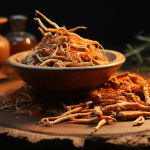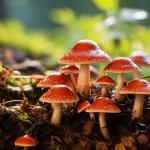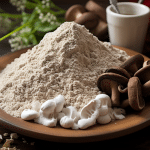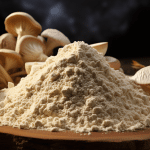It’s been proven that lion’s mane mushrooms can help with neural growth, but we wanted to take a deeper look at recent studies on the effects of lion’s mane for neuropathy, and were pretty excited by what we found. Let’s dive right in.
The lion’s mane mushroom (Hericium erinaceus) is one of the healthiest medicinal mushrooms that you can eat. It is typically grown in North America, Asia, and Europe, and is used extensively in alternative medicine because of its beneficial effects on mental, physical, and spiritual health.
What is Neuropathy? What Causes It?
Neuropathy is the malfunctioning and damaging of nerves, often caused by medications, autoimmune diseases, or a neurological condition, affecting the nerves located outside of the brain and spinal cord (peripheral nerves). Symptoms typically first strike nerve endings in your hands and feet, then travel up to the rest of your body.
Neuropathy is extremely painful and devastating to those who are unlucky enough to suffer from it. Certain medications may cause neuropathy, and chemotherapy patients are especially prone to having neuropathy as a side effect. Diabetes (more than half of diabetics will experience some kind of neuropathy).
Infections (such as Hepatitis B and C, HIV, Lyme, and diphtheria). Hereditary neural disorders (such as Charcot-Marie-Tooth disease). Tumors that put pressure on the peripheral nerves. Autoimmune diseases such as rheumatoid arthritis and lupus.
Symptoms of Neuropathy
Numbness and tingling of the hands and feet. Sharp or burning pain on the nerves. Dizziness and drops in blood pressure.
Does Lion’s Mane Help Neuropathy?
Yes, lion’s mane mushroom can relieve neuropathic pain. A 2019 study investigated lion’s manes’ effects in cisplatin-induced peripheral neuropathy.
Cisplatin is one of the most effective cancer drugs, typically used for the treatment of solid tumors. However, those taking large doses of it frequently suffer from neuropathic pain. This greatly limits how much treatment a cancer patient can get, and, by extension, how effective the medication is.
In that study, researchers gave half of the participants both cisplatin and the lion’s mane extract, derived from hot water extraction in boiling water, and gave the other half just cisplatin. The participants given the lion’s mane showed less evidence of neuropathy and reduced bodyweight due to the cisplatin.
The neuropathy-relieving activities of lion’s mane mushroom require more detailed investigations. In the meantime, adding this mushroom to your diet as an alternative medicine might help should you find yourself struggling with neuropathy.
Can Lion’s Mane Regenerate Nerves Or Help Nerve Function?
Studies have shown that lion’s mane mushrooms help with nerve cell regeneration. An animal study published in The International Journal of Medicinal Mushrooms investigated the neuroregenerative potential of the lions mane (high-basidiomycete) extract for treatment of peripheral nervous system injuries.
Researchers compared the effects of the lion’s mane with those of vitamin B12 (commonly used in the treatment of neuropathy) after crushing injuries to adult rats peroneal nerves. Lion’s mane caused rapid regeneration of peripheral nerves during early stages of recovery. These results are very promising and call for further research on lion’s mane and neural regeneration in humans.
What We Can Conclude About Lion’s Mane and Neuropathy
- Lion’s mane appears to relieve the neuropathic pain caused by cisplatin, a common cancer treatment.
- Lion’s mane may restore peripheral nerves after they are damaged from crushing injuries, according to one animal study.
- Lions mane stimulates production of neural growth factors, which, in turn, stimulates neural growth.
- Lion’s mane also appears to facilitate remyelination, at least according to animal studies.
More studies in humans are needed to unravel the basic mechanisms underlying the behavior and benefits of lion’s mane and its effects on neuropathy, but so far the data is supporting that lion’s mane is beneficial in relieving neuropathic pain. Given the lack of negative side effects to eating lion’s mane, its relatively low cost, and high accessibility, incorporating this medicinal mushroom into diet supplements might be warranted. Always talk with your doctor before adding any new supplement to your daily routine, especially if you’re already taking medication.
But give lion’s mane a try and let us know your experience.
You can find our favorite capsules, powders, and tincture’s on the following pages of our website and learn more about each individually:
Click here for Our Favorite Lion’s Mane Supplements
Click here for Our Favorite Lion’s Mane Powders
Click here for Our Favorite Lion’s Mane Tinctures
Click here for Our Favorite Lion’s Mane Gummies
More Benefits of Lion’s Mane
Research into the potential benefits of lion’s mane mushroom indicates that the fungus has potential for promoting neural regeneration by producing neural growth factor proteins, thereby healing brain cells. It appears to alleviate symptoms of dementia, reduce oxidative stress, as well as enhance brain function and neuronal health.
It decreases symptoms of ADHD, anxiety, and depression. Improves overall brain health and cognitive function, including learning and memory. Reduces risk for heart disease and blood clots. Improves mental clarity and protects against mild cognitive impairment and Alzheimers disease.
Lowers blood sugar levels and helps with diabetes management. Promotes the apoptosis (cell death) of tumor cells, with potential for combating cancer. Improves digestive health and prevents ulcers in the stomach. Boosts the immune system and enhances immune function. Has neuroprotective properties and decreases neural damage in autoimmune neurodegenerative diseases, such as Parkinson’s.
Maybe a better question would be, what DOESN’T this incredible mushroom do.
Additional Resources:
Lion’s Mane Mushroom for Memory
Lion’s Mane for Parkinson’s Disease
Updated 10/12/2022















